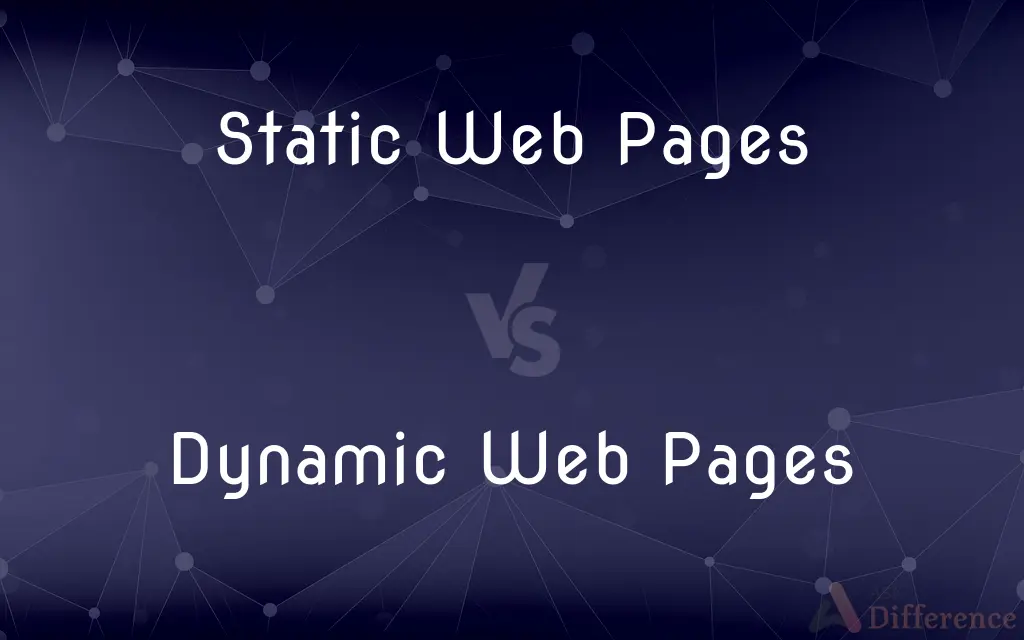Static Web Pages vs. Dynamic Web Pages — What's the Difference?
By Tayyaba Rehman — Published on January 4, 2024
Static Web Pages display the same fixed content to every user, while Dynamic Web Pages can display varied content and user interaction.

Difference Between Static Web Pages and Dynamic Web Pages
Table of Contents
ADVERTISEMENT
Key Differences
Static Web Pages are simple HTML pages that deliver the same content to every visitor. They are easy to create and host but offer limited functionality. In contrast, Dynamic Web Pages are generated in real-time, often using server-side scripting languages like PHP, Node.js, or ASP.NET. They provide a personalized experience to users based on interactions and inputs.
Static Web Pages are typically quicker to load due to their simplicity and fixed content. They are ideal for small websites with content that does not require frequent updates. On the other hand, Dynamic Web Pages are more complex, requiring server-side processing, which can result in slower load times but enables more interactive and versatile web experiences.
Static Web Pages are straightforward in terms of maintenance, as they don't involve complex coding or databases. They're ideal for information-based sites like blogs or portfolios. However, Dynamic Web Pages require regular updates and maintenance due to their complex nature, involving databases and server-side scripts, suitable for e-commerce sites, social networks, or any site requiring user interaction and data processing.
In terms of scalability, Static Web Pages can be limited. As a site grows, adding or updating content can become cumbersome. Conversely, Dynamic Web Pages scale better. They can handle large amounts of content and features like user profiles, comments, and personalized settings.
Static Web Pages are less vulnerable to security threats since they don’t interact with databases or user input. In contrast, Dynamic Web Pages, due to their interactive nature, are more exposed to security risks like SQL injection or cross-site scripting, requiring more stringent security measures.
ADVERTISEMENT
Comparison Chart
Content
Fixed content displayed to all users
Content generated based on user interactions
Complexity
Simple, with HTML and CSS
Complex, involving server-side scripting and databases
Load Time
Generally faster
Can be slower due to server-side processing
Maintenance
Easier to maintain due to simplicity
Requires regular updates and maintenance
Personalization
Limited personalization capabilities
High level of user interaction and personalization
Compare with Definitions
Static Web Pages
Static Web Pages display fixed content.
My portfolio website is a static web page.
Dynamic Web Pages
They use server-side languages like PHP or Node.js.
I implemented user authentication on our site using Node.js.
Static Web Pages
Static pages are fast and easy to load.
Visitors appreciate the quick loading time of my static pages.
Dynamic Web Pages
More complex to maintain due to their interactivity.
Maintaining our dynamic forum requires regular updates and security checks.
Static Web Pages
Easier to maintain due to their simplicity.
Maintaining my static blog is straightforward since there are no dynamic elements.
Dynamic Web Pages
Suitable for sites requiring frequent content updates.
Our news portal is dynamic to regularly update the latest articles.
Static Web Pages
Ideal for content that doesn't require updates.
Our company’s contact page is static as the information rarely changes.
Dynamic Web Pages
Capable of personalizing user experience.
Each user sees a personalized dashboard on our dynamic web app.
Static Web Pages
They are built using only HTML and CSS.
I used HTML and CSS to create a static information page.
Dynamic Web Pages
Dynamic Web Pages generate content in real-time.
Our shopping site's product pages are dynamic, showing real-time inventory.
Common Curiosities
What's a dynamic web page?
A dynamic web page generates and displays content based on user interactions.
Why would I use a static web page?
For simplicity, speed, and ease of hosting, especially for content that doesn't change often.
What are common uses of dynamic web pages?
E-commerce sites, social media platforms, and forums use dynamic web pages for interactive and personalized experiences.
What's a static web page?
A static web page displays the same fixed content to every visitor.
Are static web pages faster than dynamic ones?
Generally, yes, because they are simpler and don’t require server-side processing.
Do static web pages interact with databases?
No, they typically consist of HTML and CSS and do not interact with databases.
Can dynamic web pages be as fast as static ones?
With optimizations like caching and efficient code, dynamic pages can approach the speed of static pages.
Can I convert a static web page into a dynamic one?
Yes, by incorporating server-side scripts and databases, static pages can be made dynamic.
Can static web pages provide personalized content?
No, they cannot personalize content as dynamic pages do.
What technologies are used to create dynamic web pages?
Technologies like PHP, JavaScript (Node.js), ASP.NET, and databases are used.
Is hosting a static web page cheaper than a dynamic one?
Generally, yes, because static pages require less server resources.
Do dynamic web pages require more maintenance?
Yes, they require more upkeep due to their complex nature and security concerns.
What’s better for an online store, static or dynamic?
Dynamic, because it allows for real-time updates, user accounts, and interactive features.
Are static web pages secure?
They are more secure due to their lack of interaction with databases and user input.
Are dynamic web pages SEO-friendly?
Yes, with proper optimization techniques, dynamic pages can be SEO-friendly.
Share Your Discovery

Previous Comparison
Random Access Memory vs. Read Only Memory
Next Comparison
Insect Pollinated Flowers vs. Wind Pollinated FlowersAuthor Spotlight
Written by
Tayyaba RehmanTayyaba Rehman is a distinguished writer, currently serving as a primary contributor to askdifference.com. As a researcher in semantics and etymology, Tayyaba's passion for the complexity of languages and their distinctions has found a perfect home on the platform. Tayyaba delves into the intricacies of language, distinguishing between commonly confused words and phrases, thereby providing clarity for readers worldwide.














































